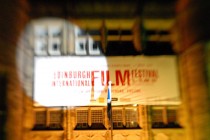Do we need to maybe all sit down and have a conversation?
It’s been a hard decade. We were all jacked up not just for a new century, but for a new millennium – a fresh new thousand years, clear of the violence and anguish that punctuated the 20th century in particular – and we ended up just getting more of the same. Corrupt governments, environmental disasters, financial meltdowns and protracted, illegal wars waged despite our objections. Compared to the relative prosperity of the nineties, it hasn’t been a walk in the park.
On top of that, if this year’s Edinburgh International Film Festival selection is anything to go by, we’re all deeply, achingly lonely. Son of Babylon was a boy’s journey to reclaim his father in the face of the Iraq war. Even The People vs George Lucas was, in part, about the loss of childhood. And now …
I flew up to Edinburgh on Sunday through thunder and lightning that bumped and shook the plane all the way north. As I downed my complimentary red wine and made firm plans to take the train next time, the man next to me leaned over and shook my hand; he was a commanding officer in the armed services, and wanted to reassure me that we were going to get through the shorthaul flight intact.
Once I introduced myself as a web consultant, he presented me with a problem. He knew his men were going on tour in the autumn, to some of the most dangerous parts of the world. Some of them weren’t going to come back. The people who fight on our behalf are disproportionately from poorer families, for whom the army is a genuine opportunity, and they were going to need support – and the government wasn’t putting up the money. He was having to resort to putting up a website with a Paypal button in order to solicit donations. Heartbreakingly, nobody was paying: despite being subject to the machinations of their countries, these soldiers were literally and figuratively on their own.
I thought about this encounter while watching The Dry Land, Ryan Piers Williams’ bleak tale about James, a US soldier (an excellent performance by Ryan O’Nan) returning home to El Paso, Texas, after serving in Iraq. Executive produced by Ugly Betty’s America Ferrera, who plays O’Nan’s wife, this is an intimate portrait of alienation and loss that finds ways to portray the horror of war in everyday life. James’s reactions to the world he finds himself in – a cow being slaughtered with a bolt gun, or a drunk shooting off his rifle in the middle of the desert – are in many ways more visceral and affecting than if Williams had chosen to show us the war itself.
El Paso is a town on the edge: the border runs straight through it, and half of the city is Juarez, Mexico. From the highway on the American side, you can see the poverty-stricken Mexican streets, but neither side is wealthy. Life is a struggle, and the characters here live in trailers and tiny houses that are a far cry from the cavernous living spaces occupied by protagonists in most Hollywood fare. We learn that James’s army buddy Raymond (Wilmer Valderrama) joined to try and get his citizenship; their colleague Henry (Diego Klattenhoff) is badly wounded and restricted to a hospital bed. Meanwhile, James’s mother (Melissa Leo, fresh from the groundbreaking New Orleans drama Treme) is fighting her own battle, dying of emphysema.
James’s struggle to regain his connection to the community around him is harrowing – nothing particularly graphic happens on-screen, but I nonetheless found myself watching much of it through my fingers – but ultimately rewarding, thought-provoking cinema.
Alienation and loneliness are also present in the festival opener The Illusionist, Sylvain Chomet’s beautifully-animated tale based on an unproduced script by the legendary French comedian Jacques Tati. It’s the story of a French music-hall magician who travels to Scotland in order to find work. Along the way, he gains the company of a young girl who smuggles aboard a ferry and joins him in Edinburgh.
As you’d expect from a Tati script, it’s packed full of silent set pieces that invariably raised a laugh from the audience. Similarly, Chomet (who made 2003′s Belleville Rendezvous) has created some incredibly detailed hand-drawn animation that shows how little the medium needs 3D or computer generated imagery. Indeed, the moments when film does let the computer in on the action are when the magic is temporarily lost, particularly during a final swoop over Edinburgh.
Unexpectedly, it’s also hauntingly sad. There’s been some debate over the origin of the story – Tati may have written it for his French daughter, who handed the manuscript to Chomet, or it may have been about his abandoned daughter from the north-east of England, whose story came to light during the making of the film. The story paints parents are magicians: people who work frantically, and sometimes make hard sacrifices, behind the scenes in order to create lives for their children. I certainly walked out of the theatre reflective on my own parents, and the hardships they went through for me without my realising it. As the curtain fell on the Festival Theatre stage and the audience erupted into applause, I felt like I was by myself for a few moments; contemplative, alone. Reading some of the feedback afterwards, I think maybe I was.
@RichardWiseman Just at opening of new animation ‘The Illusionist’. Looks great. Plot: dull dull dull. July 16
@jirichardson The Illusionist was beautiful & made Edinburgh look it too, but the story’s a bit soporific. #EIFF July 16
I disagree. It maybe doesn’t have the action of a Miyazaki film, for example, but that’s hardly the point: more than anything else, it’s an autobiographical character study of a man whose power to entertain the public came at the price of a stark alienation from the people he was connected to the closest. In that sense, despite having been written and set in the 1950s, it’s a film that’s both current and unmissable.














Comments